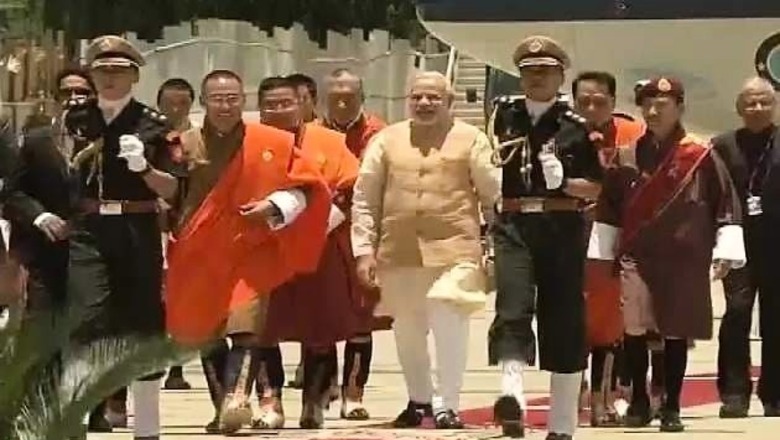
views
New Delhi: Prime Minister Narendra Modi begins on Sunday his first visit abroad since taking office, arriving in Bhutan to launch a drive to reassert Indian influence in the region, offering financial and technical help and the lure of a huge market.
The tiny Buddhist nation, wedged in the Himalayas between India and China, is the closest India has to an ally in South Asia, a region of bristling rivalry where China is making inroads.
While India has been struggling recently with policy paralysis and a slowing economy, China has been building ports in Sri Lanka, Bangladesh and in its "all-weather ally" Pakistan. China overtook India as the biggest foreign investor in Nepal in the first six months of this year.
Modi's BJP has vowed to end the neglect of neighbours and in an unprecedented gesture, he invited all regional leaders to his inauguration last month.
On Sunday, Modi will lay the foundation of a 600 MW hydroelectric power station in Bhutan and inaugurate a parliament building constructed by India.
"Bhutan and India share a very special relationship that has stood the test of time," Modi said before his departure for Bhutan's capital, Thimphu, which is nestled in mountains and was for centuries closed to outsiders.
"Thus, Bhutan was a natural choice for my first visit abroad."
In the longer term, Modi's government aims to make India the dominant foreign investor across South Asia as well as the main provider of infrastructure loans, in the same way China has done in much of the rest of Asia and in Africa.
Consolidating ties with difficult neighbours like Pakistan and Bangladesh could reduce poverty and transform regional security relationships, Indian officials say.
"Although India would like to have a greater say in South Asian matters beyond trade, so far we have not been able to exercise substantial political clout," said PD Rai, a member of parliament from the Sikkim, which shares a border with Bhutan.
"Modi's first visit to Bhutan will have to be looked at in this light."
'Pleasant surprise'
India's neighbours have responded enthusiastically to Modi's overtures. His Pakistani counterpart, Nawaz Sharif, overcame resistance at home to attend the inauguration even though political ties remain fragile and marked by deep distrust.
On Sunday, giant portraits of Modi and his Bhutanese counterpart, Tshering Tobgay, were strung up along a mountain highway with switchback bends that Modi will take from the airport to Thimphu. He opted to go by road instead of by helicopter.
School children gathered early on the tree-lined route as prayer flags tied high on poles fluttered in the wind. Beyond them rose dark slopes where people looked out from homes and monasteries clinging to unlikely perches.
"Given that India has so many competing priorities and that the newly elected prime minister could have visited any other country, it did come as a pleasant surprise," Tobgay said.
Bhutan, the size of Switzerland and with a population of 750,000, has only recently emerged from centuries of isolation.
Its first road was built in 1962 and television and the Internet arrived in 1999.
It is the world's first country to monitor gross national happiness an alternative to gross domestic product, to balance a tentative embrace of modernity with an effort to preserve traditions.
But Bhutan, which the made the transition from absolute monarchy to parliamentary democracy in 2008, is struggling with high unemployment and a growing national debt.
The government that took power 2012 says rather than talk about the happiness index, it wants to focus on obstacles to happiness.


















Comments
0 comment